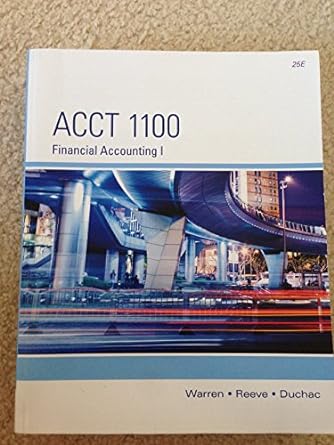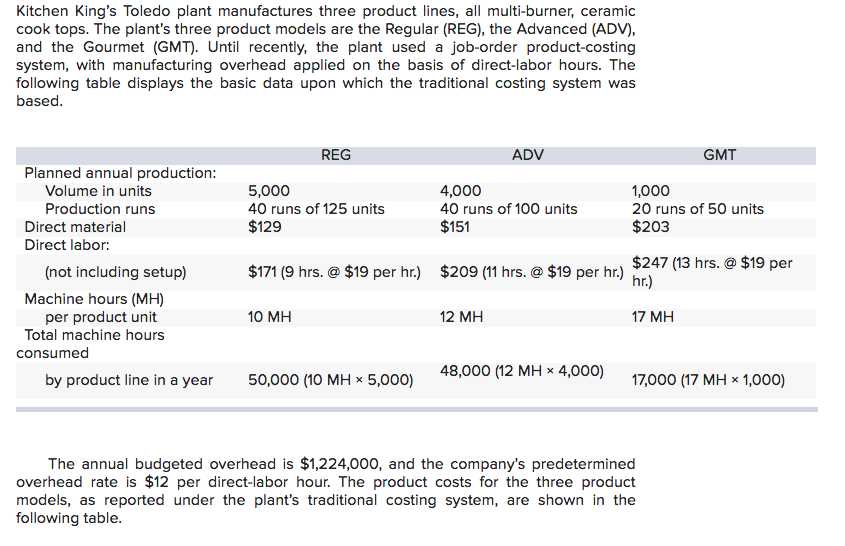
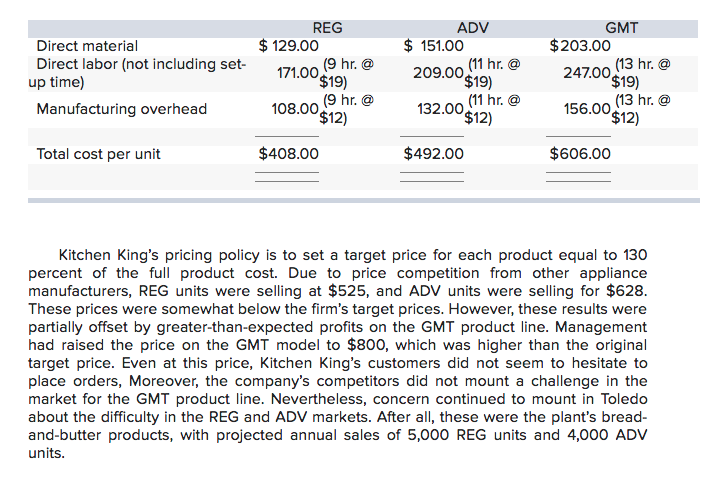

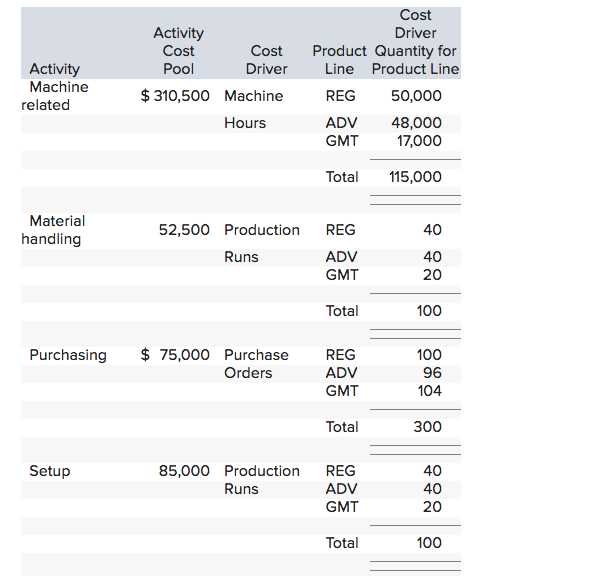
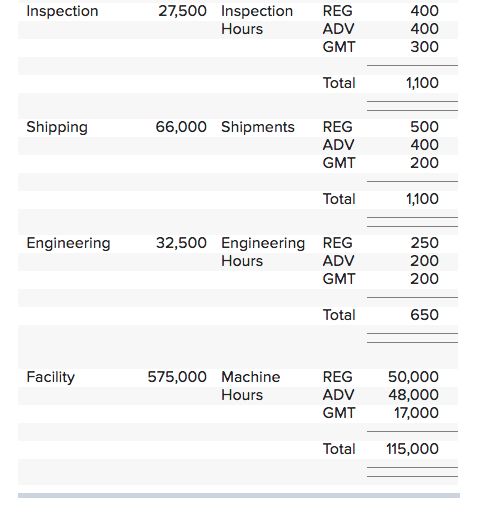
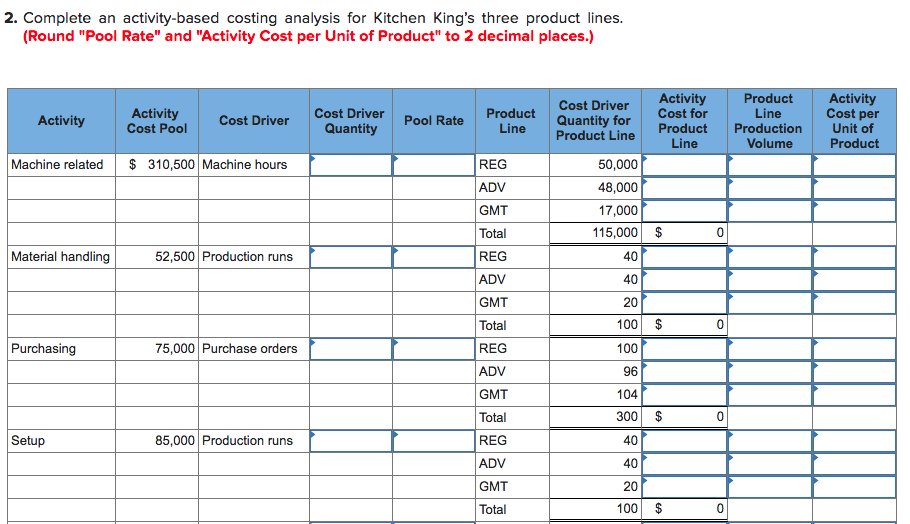
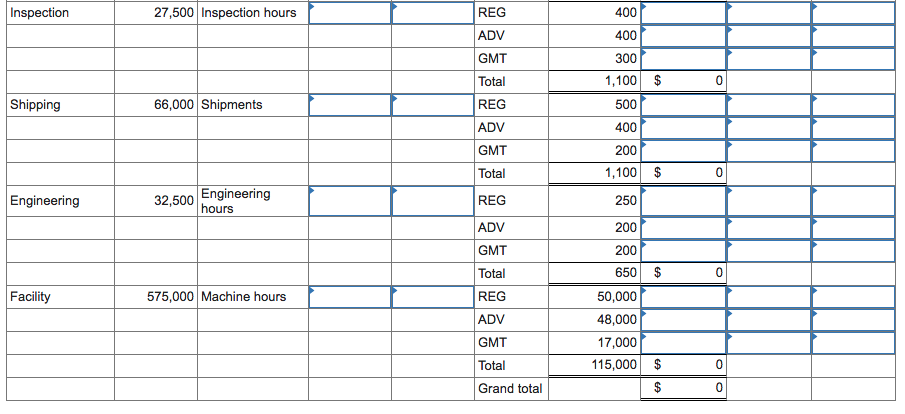
Kitchen King's Toledo plant manufactures three product lines, all multi-burner, ceramic cook tops. The plant's three product models are the Regular (REG), the Advanced (ADV), and the Gourmet (GMT). Until recently, the plant used a job-order product-costing system, with manufacturing overhead applied on the basis of direct-labor hours. The following table displays the basic data upon which the traditional costing system was based REG GMT Planned annual production: Volume in units Production runs 5,000 40 runs of 125 units $129 4,000 40 runs of 100 units $151 1,000 20 runs of 50 units $203 Direct material Direct labor $171 (9 hrs. $19 per hr.) $209 (11 hrs.@ $19 per hr.) $247 (13 hrs. @ $19 per hr (not including setup) Machine hours (MH) per product unit Total machine hours 10 MH 12 MH 17 MH consumed 48,000 (12 MH x 4,000) by product line in a year 50,000 (10 MH x 5,000) 17,000 (17 MH x 1,000) The annual budgeted overhead is $1,224,000, and the company's predetermined overhead rate is $12 per direct-labor hour. The product costs for the three product models, as reported under the plant's traditional costing system, are shown in the following table ADV GMT 129.00 $151.00 (9 hr. @209.00 Direct material $203.00 Direct labor (not including set Manufacturing overhead Total cost per unit 24700(13 hr.a 156.00 (13 hr. @ $19) (11 hr. $12) up time) $19) 108.00 (9 hr. @ 132.00 $408.00 $492.00 $606.00 Kitchen King's pricing policy is to set a target price for each product equal to 130 percent of the full product cost. Due to price competition from other appliance manufacturers, REG units were selling at $525, and ADV units were selling for $628 These prices were somewhat below the firm's target prices. However, these results were partially offset by greater-than-expected profits on the GMT product line. Management had raised the price on the GMT model to $800, which was higher than the original target price. Even at this price, Kitchen King's customers did not seem to hesitate to place orders, Moreover, the company's competitors did not mount a challenge in the market for the GMT product line. Nevertheless, concern continued to mount in Toledo about the difficulty in the REG and ADV markets. After all, these were the plant's bread and-butter products, with projected annual sales of 5,000 REG units and 4,000 ADV units Kitchen King's director of cost management, Angela Ramirez, had been thinking for some time about a refinement in the Toledo plant's product-costing system. Ramirez wondered if the traditional, volume-based system was providing management with accurate data about product costs. She had read about activity-based costing, and wondered if ABC would be an improvement to the plant's product-costing system. After some discussion, an ABC proposal was made to the company's top management, and approval was obtained. The data collected for the new ABC system is displayed in the following table. Cost Driver Activity Cost Pool Cost Product Quantity for Driver Line Product Line Activity Machine 310,500 Machine REG 50,000 ADV48,000 17,000 related Hours GMT Tota 115,000 Material handling 52,500 Production REG ADV GMT 40 40 20 100 Runs Total 100 96 104 Purchasing 75,000 Purchase REG ADV GMT Orders Total 300 85,000 Production REG ADV GMT 40 40 20 Setup Runs Total 100 Inspection 27,500 Inspection REG ADV GMT 400 400 300 Hours Total 1,100 Shipping 66,000 Shipments REG ADV GMT 500 400 200 Total 1,100 32,500 Engineering REG ADV GMT 250 200 200 Engineering Hours Total 650 Facility 575,000 Machine REG ADV 48,000 GMT 50,000 Hours 17,000 Tota 115,000 2. Complete an activity-based costing analysis for Kitchen King's three product lines. (Round "Pool Rate" and "Activity Cost per Unit of Product" to 2 decimal places.) Product Activity Cost per Production Unit of Product Cost Driver Activity P Activity Cost Pool Cost Driver Quantity Cost for Product Quantity for Product Activity Cost Driver Pool Rate Line Product Line Volume 50,000 48,000 17,000 REG Machine related 310,500 Machine hours ADV GMT Total REG ADV GMT Total REG ADV GMT Total REG ADV GMT Total 115,000 $ 0 40 40 20 100$ 100 96 104 Material handling 52,500 Production runs 0 Purchasing 75,000 Purchase orders 300$ 0 40 40 20 100$ Setup 85,000 Production runs 0 400 400 300 1,100 $ 500 400 200 1,100 $ 250 200 200 650 $ 50,000 48,000 17,000 Inspection 27,500 Inspection hours REG GMT Total REG 0 Shipping 66,000 Shipments GMT Total REG 0 Engineering 32,500 Engineering hours GMT Total REG 0 Facility 575,000 Machine hours GMT Total Grand total 115,000 $













